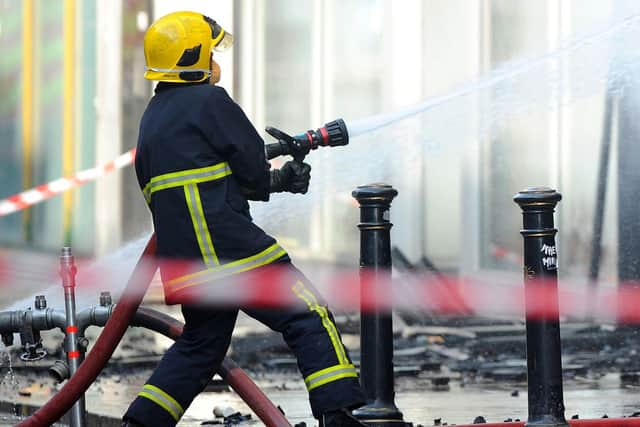Bedfordshire fire service in appeal for more on-call firefighters as crews take longer to respond
and live on Freeview channel 276
Bedfordshire fire crews are taking longer to respond to emergencies than they did just over a decade ago, figures show.
The Fire Brigades Union say a national slowing in fire response times is down to "huge levels of cuts" to services across England.
Advertisement
Hide AdAdvertisement
Hide AdAnd Bedfordshire Fire and Rescue Service (BFRS) is appealing to anyone who wants to become an on-call firefighter to get in touch


Home Office data shows that the Bedfordshire Fire and Rescue Service responded to primary fires – the most serious kind – in an average of nine minutes 44 seconds during the year to September 2021.
Including one minute 38 seconds for call handling and five minutes 43 seconds drive-time, that is faster than in the 12 months to September 2020, when the average response time was nine minutes 46 seconds.
But the figures show the response time had slowed since 2011, when crews attended primary incidents in around eight minutes 10 seconds.
Advertisement
Hide AdAdvertisement
Hide AdThat comes despite a drop in the number of call-outs to primary fires, which fell from 1,132 in 2011 to 632 last year.
The Fire Brigades Union say there has been a long-term slowing of response times nationally due to decades of funding cuts resulting in fewer firefighters, fire engines and stations.
Andy Dark, assistant general secretary of the FBU, said: "It is no surprise that response times are increasing – central government cuts are entirely to blame for this reduction in services and our communities deserve better.
"The Government is playing roulette with our lives and our properties.
"We are being left for longer as our houses burn."
Advertisement
Hide AdAdvertisement
Hide AdA spokesman for Bedfordshire Fire and Rescue Service (BFRS) said: "Whilst in the period from 2011 Bedfordshire Fire and Rescue Service has implemented more efficient crewing arrangements which has reduced the overall number of wholetime firefighters by eight per cent. However despite this there has been no reduction in the number of fire stations or fire appliances in Bedfordshire.
"The average response time is affected by a number of factors including changes in the volume of traffic, changes in the built environment and changes in the profile of primary fires (in terms of numbers, type and location etc).
"As part of our community risk planning arrangements, Bedfordshire FRS continuously reviews its emergency cover provision to ensure that resources are matched to risk.
"BFRS is seeking to increase the number of on-call firefighters and we are in the process of recruiting a new cohort of trainee firefighters and we have plans to recruit more firefighters over the next two years. This is also supported by our ongoing on-call firefighter recruitment.
Advertisement
Hide AdAdvertisement
Hide Ad"Our fire appliances are crewed by a mix of both whole-time and on-call firefighters. It is becoming increasingly challenging to keep our on-call firefighters, so we would make a plea to our communities and employers to come forward to support our on-call recruitment campaign."
Separate figures show that since 2011, the number of full-time equivalent firefighters employed by the service dropped from 191 to 175 last year – an eight per cent fall.
And the brigade's overall staffing levels were down eight per cent from 316 in September 2011 to 291 in 2021.
Staffing levels have dropped significantly nationally with brigades now employing 25 per cent fewer non-managerial firefighters and 22 per cent fewer total staff members than were in role in 2011.
Advertisement
Hide AdAdvertisement
Hide AdAcross England, the average response time for primary incidents – those which have most potential to cause harm to people or properties – is now 37 seconds slower than it was in 2010.
Last year, it was six seconds slower than recorded in the year to September 2020.
Fire Minister Lord Greenhalgh said thousands of firefighters had been recruited across the country in 2021 and that fire and rescue authorities would receive around £2.3 billion to support their work.
He added: “Firefighters work tirelessly every day to protect our communities and the government has consistently given them the resources they need to keep people safe.
“Fire response times can fluctuate annually depending on many factors such as road traffic and weather but have remained relatively stable since March 2015.”
